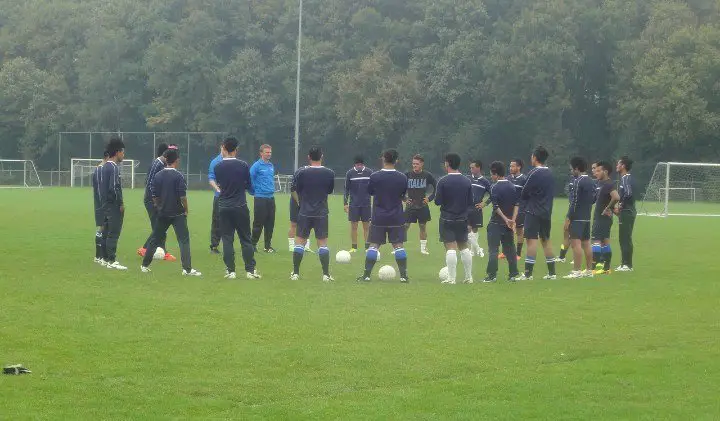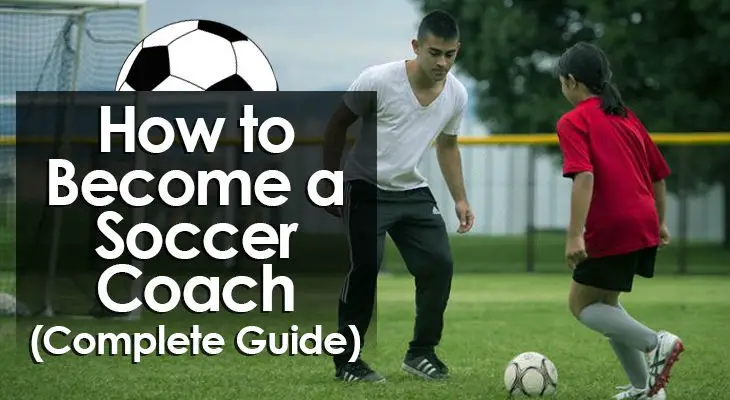How to Become a Soccer Coach (Complete Guide)
So, you want to learn how to become a soccer coach?
Fantastic!
First thing you must know is that there are many tasks a soccer coaches needs to take care of — it’s definitely no walk in the park!
Besides running training sessions, working to improve players, and coming up with strategies to beat the opposition, soccer coaches also have to liaise with parents and work out how everyone’s going to get to the game.
And this is really just the tip of the iceberg.
With an almost endless list of tasks and responsibilities, being a soccer coach is certainly a very challenging yet very rewarding job.
Let’s take a look at how you can become a soccer coach!
Getting Started with Youth Soccer
Before embarking on your soccer coaching journey, it’s important to note that many roles are voluntary and unpaid.
Most coaches at the youth soccer level give their time and effort because of their love for the game.
If you’re going to be standing on the sideline in the cold and rain every season, you need to have a passion for the sport!
One of the best ways to start off coaching is to contact one of the local clubs in your area and see if you can either coach one of the youth teams or help out as an assistant.
If there aren’t any opportunities going then it is always worth checking with your local school, university, leisure club, or even your group of friends to see if anyone needs a coach.
Besides giving you a greater insight into how a club is run and what is expected of a coach, helping out with a team also increases your understanding and knowledge of the beautiful game.
Seeing how another coach manages their team, organises training sessions, and communicates with their players is also an invaluable experience which will surely come in handy in the future.
At this early stage of your coaching career you really want to surround yourself with soccer, learn as much about coaching as possible, and start to run drills and exercises yourself.
While a club would prefer for you to already have some coaching qualifications before starting, the most important pre-requisites are a passion for soccer and a good understanding of the game.

Tasks and Responsibilities
The role of soccer coach is very multi-faceted.
Not only do you have to act as a leader and mentor, you also have to be a role-model, trainer, and teacher to your players.
There are an almost endless array of different tasks that coaches have to take on, and that’s before we even get into the man-management and communication skills needed to make a success of it!
Here are just some of the tasks required of a soccer coach:
- Run training sessions
- Prepare drills and exercises in advance
- Improve the team’s conditioning
- Come up with tactics
- Decide upon a formation and the starting line-up
- Give team talks
- Evaluate performances
- Provide feedback to the players
- Keep detailed records
- Research the opposition
- Liaise with parents
- Organise training times, pick up points and schedule matches
As you can see, the role of a soccer coach certainly is very varied and they really do need to have a wide array of different skills!
Managing Personalities and Communication
Besides the organisational side of things and the understanding of the game that you need if you are to be a success...
A large part of the role is actually managing the personalities within the team and communicating with your players.
To do this in the most efficient way, you need to build up a good relationship with the players that is based on a mutual trust and respect.
By winning them over and showing them that you care about each and every player on the team, you’ll slowly be able to help them improve as they listen to your advice and work on weak points of their game.
As you can see, a major part of soccer coaching is about the relationships you develop and the way you convey information and decisions to the team.
As you also act as a role-model to the players, it is important that you set a good example and show them both how to win and lose with grace, play hard but fair, and act with integrity at all times.
A coach should not only help their players improve on the pitch but also show them how to act off it too.
Important Soccer Coaching Skills
While a soccer coach is obviously there to develop players and improve their touch, control, technique, skills, and stamina...
Much more goes into coaching a team as you can see.
Winning games, for example, while that part of coaching is important, isn’t the be all and end all.
Your priority is to help the players enhance their skills and learn how to play as part of a team.
In essence, a soccer coach should look to develop the following skills:
- Leadership
- Organisation
- Teamwork
- Communication
And also be able to:
- Motivate and encourage the players
- Earn their trust and respect
- Act as a mentor and teach them good behaviours
- Manage squad dynamics
- Create a fun and welcoming atmosphere
- Be patient and understand that every player is different
- Build their confidence, skills and technique
- Be an authority figure
- Keep ahead of new developments in the game and keep improving their coaching skills

Soccer Coaching Qualifications
So, your initial question about how to become a soccer coach has been answered.
Next on the list are qualifications...
As you advance through the youth teams, you’ll eventually need to start thinking about taking some coaching qualifications.
This is because some age groups require various certificates and proof of expertise for you to coach teams.
As each soccer federation has its own different rules and regulations concerning soccer coaching, it’s important to check what qualifications you need to coach at each level.
While the younger age groups at a soccer club or an informal leisure team often don’t require you to have your coaching badges, later age groups and more serious teams demand a bit more expertise from you as a coach.
Let’s take a quick look at the various coaching qualifications available to you in a couple of different countries around the world.
The United Kingdom
The FA has a myriad of different courses for you to work through, and it’s well worth checking out all of the opportunities if you’re serious about being a coach and are based in the UK.
While some of them focus on the coaching side of things, others teach you medical first aid, how to identify and scout talented players, and how to safeguard children in soccer.
In addition to this, you can also learn how to work as a specialised goalkeeper coach or only with futsal players while others help you coach deaf, blind, and disabled players.
These badges take various amounts of time to complete and understandably progress in difficulty the further you go.
Starting off with FA Level 1 course, you’ll learn how to work with players under the age of 7 and provide them with fun and engaging coaching sessions.
After this you can work your way up through the older age groups, learning more about the tactical and technical side of things as well as the psychological and social needs of your players.
These coaching qualifications are invaluable and are indeed necessary if you’re looking to coach in the UK.
You can take a look at the various badges on offer here.
The United States of America
Across the Atlantic in the US, there are a different array of courses and qualifications for you to work your way through on the way to becoming a soccer coach.
While some of these can be completed online, others require you to attend a workshop or coaching session at a local academy.
Starting off at the U6-8 age group, you’ll learn how to run 4v4 matches and set up age appropriate training sessions.
As you gain more experience, you’ll later on be able to coach older youth teams before progressing on to coaching adults and even pro players.
While some of them are free to complete, others you’ll have to pay for.
The courses take various amounts of time to complete and the pre-requisites for joining the courses get more robust the further you progress.
Some of them require the applicant to have a couple of years coaching experience.
You can find U.S. Soccer’s coaching qualifications here.
Australia
Football Federation Australia again has its own different courses and coaching qualifications for you to complete.
While the ‘Community’ courses are aimed at volunteers and amateur coaches working with local schools, clubs, and universities...
The ‘Advanced’ courses are longer and more intensive in nature and prepare you to become a fully fledged professional coach.
These again take various amounts of time to complete and you’ll again learn all of the different skills that you need to make it as a coach.
To find out more information on the courses in Australia, you can take a look here.
Continue Improving and Learning
Besides working on your coaching badges and progressing through the various qualifications of your local soccer association...
The secret to being a good coach is to keep improving all the time.
This means immersing yourself in the world of soccer, watching matches, listening to managers discuss the tactical side of the game, and noting down interesting ideas you come across.
As so much goes into coaching a team, there’s always something that you can improve upon and you’ll certainly get better the more experience you gain.
A fantastic source of help are the other coaches at your club, and it’s well worth bouncing ideas off of them as well as asking them for advice occasionally.
While gaining your coaching qualifications is definitely very important if you want to be a soccer coach, there are many other ways in which you can learn about the beautiful game.
Conclusion
As you will have noticed, learning how to become a soccer coach is very challenging as there are 101 different things to think about.
- What’s my starting line up going to be?
- How do I tell that player they didn’t make the squad?
- Did I pack the kit?
- What’s the next drill going to be?
Besides the wide array of different skills and coaching qualifications you need, you also have to constantly keep working to improve yourself and further your knowledge of the beautiful game.
Being a soccer coach is very much a labour of love as you have to put a lot of time and effort into your passion.
It certainly can be very rewarding and satisfying, however, especially when everything is going right and everyone is enjoying their soccer.
With so many teams in need of a passionate, caring, and knowledgeable coach, you’re sure to find a team in no time — and it’s never too early or too late to start gaining experience!
Start today and look up what teams and clubs are in your local area.

